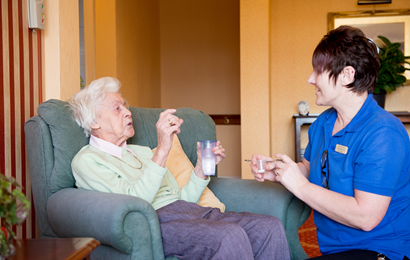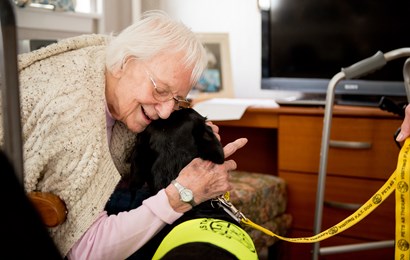People’s rights to meaningful connection with others
Connecting with others is essential to everyone’s health and wellbeing and forms part of our human rights. Every adult and older person living in a care home has the right to connect with family, friends and community. They have the right to have visits and to go out if they wish. Care homes should support this and should not put any barriers or restrictions in place.
Scotland’s Health and Social Care Standards set out what people should expect when using health, care or social work services. In 2022, two new Standards were introduced that cover the right to visit even if there is an outbreak of infectious disease.
The Care Reform (Scotland) Bill was passed in June 2025. This enshrines Anne’s Law into legislation, upholding the rights of people living in adult care homes to see their loved ones and identify Essential Care Supporters.
We have produced a poster which informs people about their rights.
Guidance on what we expect from care homes
People living in care homes must be supported to stay connected to loved ones and to take part in their community if they wish. We advise care homes on good practice that supports people to stay connected with their loved ones, have visits and take part in their community. Where this support is not happening, we can use our powers to ensure it does. Everyone will have their individual needs and preferences for connection with others, and this should be included in personal planning so that everyone is supported to connect in the ways that are right for them.
We expect care homes to support visiting and we have published a factsheet which explains how visiting should be supported in normal and exceptional circumstances.
We are on hand to advise and support any care home looking to improve visiting and connection. If you are a provider or manager, please contact your inspector.
Self-evaluation tool
Download the meaningful connection self-evaluation tool below:
How visiting and going out should normally work
We expect people who live in care homes to be able to see their visitors at any time and without restriction. This includes outings from the home. Children and pets should be welcome to visit.
Care homes should not operate booking systems or restrict when people can visit or go out. Visitors should not have to give notice, and visits and outings should not have a time limit. Visitors should be able to access the home easily and without unnecessary delay.
Family carers should be included as partners in care, and should be able to be directly involved in supporting their loved one with day-to-day care if this is what they both want.
Standard infection control precautions should always be followed, and visitors should not enter a care home if they are potentially infectious with any illness.
What happens in exceptional circumstances?
In exceptional circumstances, there may be restrictions to visiting. Any restriction must be robustly risk assessed and must be for the minimum possible period. Restrictions should as non-invasive and non-intrusive as possible, and normal visiting must resume as soon as possible. In the event of an outbreak of an infectious disease, temporary restrictions on visiting may be required. These are overseen by the local Health Protection Team in dialogue with the care home manager, and will be kept under frequent review.
People experiencing care still have the right to have in-person visits from nominated relatives/ friends (now called Essential Care Supporters). People visiting the home may be requested to follow additional infection prevention and control precautions.
The care home should ensure that information about any temporary restrictions, along with the expected duration of restrictions, is clearly communicated to all relevant people.
Technology and meaningful contact
People in Scotland who experience care are increasingly using digital connectivity and technology to support their wellbeing and daily activities, however, we recognise this may not meet needs for everyone. We have published a practice guide for care services on how technology and digital devices can be used to make a positive impact on health and wellbeing for people experiencing care.
Support and advice
The Care Inspectorate is here to support all care services to improve. For support and advice, contact your inspector who will be happy to explore issues and solutions with you. You can also contact the Meaningful Connection, Visiting and Anne’s Law project team directly at This email address is being protected from spambots. You need JavaScript enabled to view it..
Local NHS health protection teams provide advice and support on infection prevention and control and managing outbreaks of infectious diseases.
Health and social care partnerships are responsible for social care provision across local areas and may be able to provide practical advice and guidance to help services support better outcomes for people experiencing care. Each health and social care partnership is unique, so we advise contacting the partnership that covers your service location to understand what support you can access.
Open Badges
The Meaningful Connection, Visiting and Anne’s Law project team have, in partnership with SSSC, developed a series of Open Badges on different aspects of meaningful connection.
The badges, linked to the project’s series of webinars and factsheets, provide an opportunity for staff to reflect upon, develop, and evidence their understanding of and commitment to supporting meaningful connection in day to day practice. They will also be helpful for employers to use as part of staff training and development, and for staff to evidence their Continuous Professional Learning. The badges are geared towards staff working in care homes for adults and older people, but will also be of interest to those working in other services.
Whistleblowing
If you work in social care and want information about how to raise a concern about your workplace, visit our webpage on whistleblowing.




